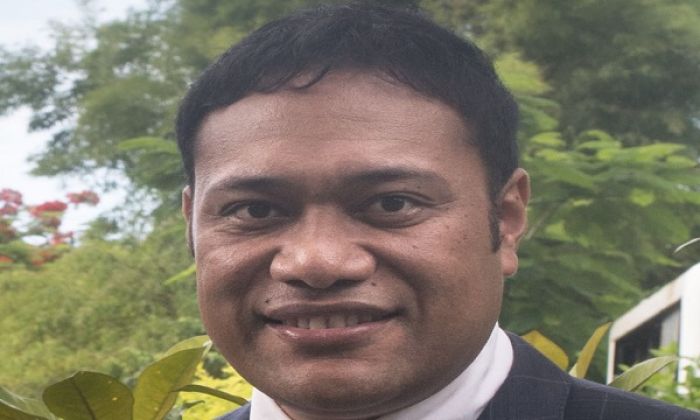Doing development "The Pacific Way" Featured
 Dr. Kaitu'u Funaki
Dr. Kaitu'u Funaki
10 February, 2018. Too many people see development aid as money for nothing, says Dr Kaitu‘u Funaki. Part of the reason for the troubled dynamic between Pacific island nations and their development partners, he argues, is that no one enjoys being a beggar.
The process of unmasking one’s problems, asking for help, justifying the reasons for it, and then being led by the hand through the implementation is not only undignified, it militates against more traditional conceptions of how Pacific leaders resolve problems, manage power relationships and establish authority.
The 41 year-old Tongan academic has devoted much of his life to a diverse range of sources, ranging from anthropology to development, from politics and international relations to a formal study of what he terms ‘generosity’.
Generosity is the rich kernel at the core of his all-encompassing vision of a new framework for international development.
It’s impossible to do justice to such a broad vision in a single column. In its broadest expression, though, it runs like this: If we widen the definition of wealth, we can find new and better ways to capture the exchanges that enrich us all, but which don’t necessarily involve money or good.
Put simply, sometimes a poor friendly neighbour is more valuable to the community than a rich unfriendly one—or more to the point, they can be just as valuable as a rich friendly one.
Dr Funaki suggests measuring our contributions to the international community using six basic categories: United Nation Votes (UNV), International Security Cooperation (ISC), Contribution to Cultural Heritage (CCH), Contribution to Humanity and Livelihood (CHL), Contribution to Sports and Research (CSR) and Contribution to Peace and Prayers (CPP).
This may sound a little too touchy-feely to the disciples of realpolitik, but there’s a great deal more to this than meets the eye.
Just as influential economists from the Amartya Sen school of thought have argued that there’s more to prosperity than wealth, Kaitu’u Funaki argues that there are more ways to express generosity than with cash.
Money, in fact, becomes just one of six pillars holding up his vision of an international community united in its understanding of development.
Different nations conceive of their overseas development aid, or ODA, differently.
The traditional colonial view was to spread enlightenment and ‘civilisation’. That changed when countries began to realise that they were simply exchanging one civilisation for another, and they weren’t necessarily trading up. And not to put too fine a point on it, they were being pillaged in the bargain.
The Cold War period was characterised by the client-state mentality, which required that nations choose which superpower to line up behind, and in return needy countries received a dole based on their strategic value.
Based on the rhetoric flying over our heads at the moment, some people seem to think this view still applies.
But since the creation of the Millennium Development Goals, the global community has focused development efforts more and more clearly on the concept that poverty is a global problem, and that it is not simply the natural state of things.
This concept got further refined when the Sustainable Development Goals succeeded the MDGs.
Over that period, poverty, malnutrition and starvation have receded worldwide. East Asia and the Pacific have seen the greatest rate of reduction.
The World Bank reports that extreme poverty has decreased in this region from nearly 1.1 billion people in 1981 to less than 300 million in 2008.
During the same period, the World Bank reports that overall population in the region rose from 1.58 billion to just under 2.2 billion.
We are, in short, in the midst of one of the most rapid and widespread rises in global prosperity in history.
But a 2011 Brookings Institute report shows that this is not entirely good news. Countries may be wealthier, but they are not necessarily more stable, and they have not necessarily improved equality of access to wealth.
On top of this, the actual purchasing power of a dollar varies greatly from place to place—a lesson that must constantly be re-learned in the Pacific as each new crop of development specialists comes through.
Dr Funaki’s GNG framework would address many of these inequities by better capturing the many ways in which countries and societies enrich one another through their interactions.
His talk two days ago at the National Cultural Centre included a brief presentation of the framework as well as a question and answer session at the end.
He has also been given a warm reception by the policy and planning contingent in the Prime Minister’s Office.
Dr Funaki’s vision is evangelistic at its core, and that may lead some of the more hard-headed members of the international community to dismiss his vision as just another chorus of Kumbayah around the campfire.
Certainly, its merits will be more obvious to Pacific islanders than to others. But that their problem more than it is ours.
There is a hard conceptual nut in the middle of his philosophy of generosity, and Dr Funaki’s idea may just be the acorn that grows into the proverbial oak tree.
Even naysayers owe it to themselves to study his proposal closely.
3 comments
-

One of the pitfalls of the so-called economic development as a post-WW11 UN-led and Western-driven capitalist doctrine is undoubtedly the failure to "take culture seriously" -- not to mention the adoption of a "partial" rather than a "total" approach across the material-individual, intellectual-spiritual and social-cultural realms and not just the material-individual over the intellectual-spiritual and social-cultural domains.
It is therefore truly refreshing to reflectively take note of the great call by Dr Kaitu'u Funaki for "doing development in the Pacific way(s)," both immediately on face value and ultimately in terms of his proposed theory of "generosity.".
By "doing development in the Pacific way(s)," reference is made, so I think, to not only the integration of the "Pacific ways of doing things" -- as opposed to the "other ways of doing things," notably the "Western ways of doing things" -- but also the utilisation of refined "knowledge (and skills)" theoretically-practically, critically-functionally acquired in ancient ha'a professional class-based education -- which are constituted or composed in "culture" as a human receptacle and transmitted or communicated in "language" as a social vehicle.
Moreover, knowledge (and skills), culture and language as inseparable intersecting or connecting and separating temporal-formal, spatial-substantial (and functional-practical) entities in reality as in nature, mind and society are constantly mediated through sustained symmetry and harmony to create beauty, in and over both time and space.
On the other hand, the same applies to the so-called political governance (that is, both good governance and good leadership) as a Post-Cold War World Bank-sanctioned, Western-pushed democratic doctrine -- underlined by transparency, accountability, equality (or more befittingly equity), and justice -- all informed by the so-called "rule of law."
Is not "generosity" a two-way transaction going on between entities, identities or tendencies involved in the natural, intellectual and social processes -- as in the tavaist, realist view, that all things in reality, as in nature, mind and society, stand in eternal relations of exchange, giving rise to order and conflict (that is, intersection or connection and separation); that order and conflict (that is connection and separation) are of the same logical status, in that order (or connection) is a form of conflict (or separation); and that conflict (or separation) -- that is, a condition of crisis -- is transformed to order (or connection) -- that is, a state of stasis -- by way of mediation through sustained symmetry and harmony to create beauty?
It quite simply follows that the crisis at the intersection or connection and separation between Moana Oceania (Pacific) and Western cultures (and knowledge [and skills] and languages) -- in view of the fact that we are hard put to get rid of the Moana Oceania (Pacific) cultural "roots" and, at the same timespace, to stop incoming powerful waves of Western influences generally -- as in the specific case of both economic development and political governance as respective capitalist and democratic doctrines -- where they are mediated through sustained symmetry and harmony to produce beauty.
In effect, this transformation is one of changing the current modus operandi of things from a condition of "imposition" to a state of "mediation" -- that is -- a change in the current state of the art from the rule of "autocracy" to the reign of "generosity." It is only by means of both "mediation" and "generosity" -- in contrast to both "imposition" and "autocracy" -- that both "doing economic development and political governance in the Moana Oceania (Pacific) ways" can be made viable, sustainable and understandable in meaningful ways. -

'Ofa pe 'e 'oatu he pule'anga ha'o faingamalie ke tesi ho framework (GNG) 'i Tonga na. He kuo'osi lele'i e well-being index (GNH) ia 'i he ngaahi fonua lahi 'i mamani pea 'oku ngaue ki he kakai e fonua koia. Pea koe anga pe fifili fekau'aki moe "generosity". Koe generosity koeni 'i he funga 'o e foaki ko e 'ofa pe koe fufuu mai ha asenita kehe ia 'i mui? Ko 'eku fokotu'u atu pe fekau'aki mo ho'o motolo ko eni ke fa'u ki he context 'o Tonga, pea faka-hingoa fakaTonga - ki he kakai Tonga ma'ae kakai Tonga.
-

DR. KAUTU'U FUNAKI MIGHT WANT TO TAKE UP RELIGIOUS EVANGELISM INSTEAD OF PUSHING A HYPOTHESIS WITHOUT SUPPORTING CITATIONS AS AN ACADEMICIAN...His "no one enjoys being a beggar" comment illustrates his lack of contacts with beggars.
The current government of Tonga is one that enjoys receiving handouts from other countries without even trying to create their own economics wealth. Proves that beggars enjoy handouts as long as they keep themselves poverty-qualified by not even trying to better themselves: Cancelling the 2019 South Pacific Games by Tonga is a starter. Current government rather beg for handouts than take a risk with the Games.
Little wonder Dr. Funaki received a warm welcome at Tonga's PMO: He supports their do-nothing philosophy to keep "generosity" from foreign donors flowing in. It will keep Tonga perpetually poor, and a "beggar nation".



